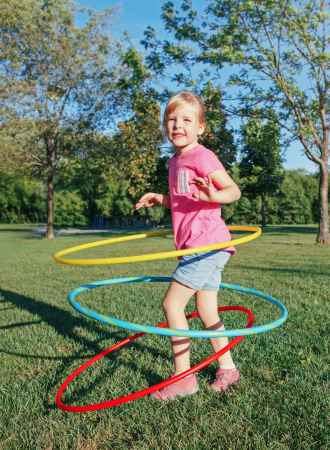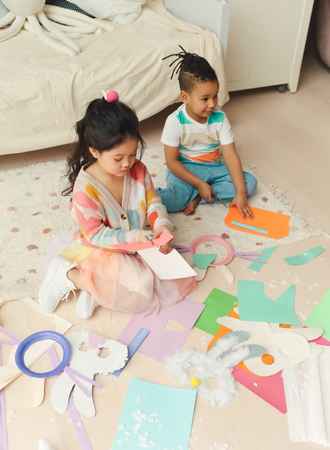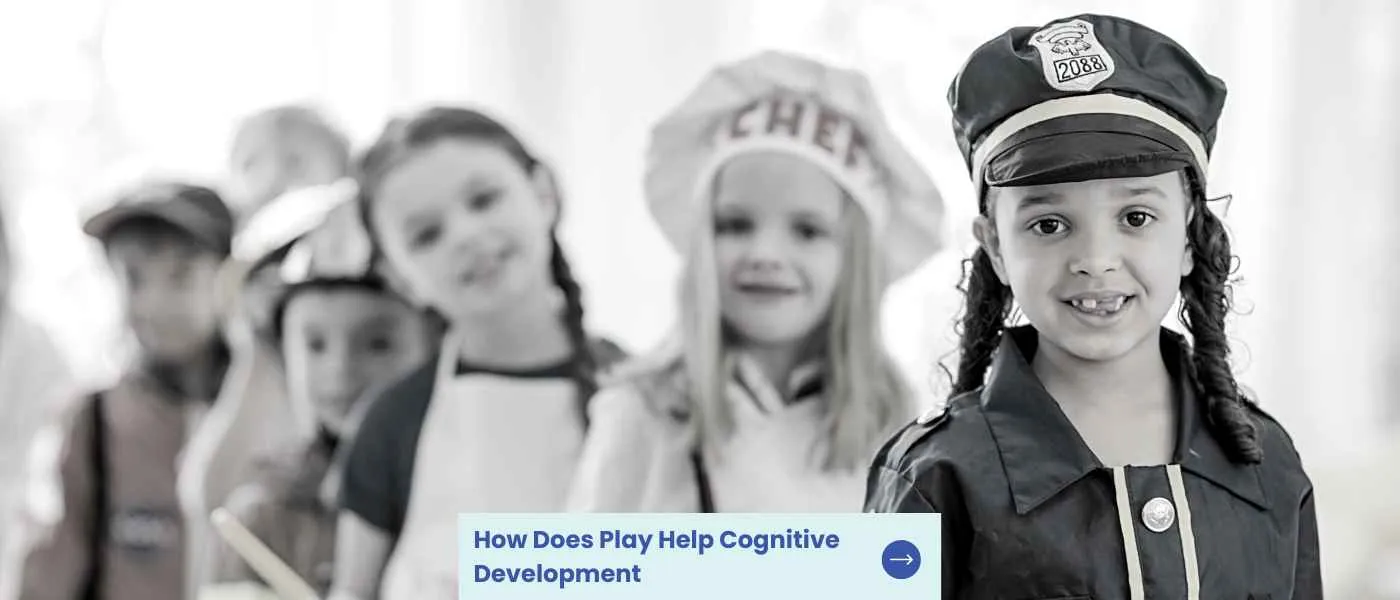Playing is an essential part of child development and can be a key factor in helping children reach their full potential. Through research-based evidence, we now know that engaging in different types of play activities helps to support cognitive growth in both young children and adolescents alike. From discovering how specific kinds of play can improve intellectual functioning to learning ways to incorporate fun into everyday tasks for maximum benefit.
In this blog post, we will discuss the various roles that playing can have on enhancing overall cognitive development. Join us as we uncover whether or not does indeed help promote brain development and healthy mental capacities!
Key Takeaways on Children Play for Cognitive Development
- Playing with educational toys is a great way to encourage cognitive development and promote mental health in children.
- Through play, children can gain the skills necessary for academic success and social interactions.
- By engaging in different types of play, such as pretend, physical activity, and social play, children can develop their cognitive abilities and skills.
Benefits of Play for Cognitive Development
Play is an essential part of a child’s development and has been shown to have numerous benefits for cognitive development. Play can help children develop memory, language and communication skills, attention span, and concentration.
Enhances memory
Through play activities such as puzzles or board games, children are able to strengthen their memories by recalling pieces of information in order to complete the task at hand. This type of play also helps them learn how to think critically and solve problems independently. For example, when playing a game like chess or checkers, the children learn they must use strategy in order to win which encourages them to practice problem solving techniques.

Develops language and communication skills
Playing with others provides an opportunity for children to practice their verbal communication skills while interacting with peers. As they engage in conversations about the game they are playing or share stories from their day at school, they are developing important language abilities that will be beneficial later on in life.
Additionally, cooperative games such as charades can help improve nonverbal communication through gestures and facial expressions which can be especially helpful for those who struggle with expressing themselves verbally.
Builds focus and concentration
Engaging in activities such as coloring books or drawing pictures with crayons or markers requires focus over a long period of time, which helps build up the ability to concentrate on tasks without getting distracted easily.
Games like hide-and-seek also require sustained attention throughout each round so that players do not lose track of where everyone is hiding, encouraging kids to stay alert even when participating in seemingly simple activities that may become monotonous after some time passes by. This improves their attention span and concentration.

Types of Play That Support Cognitive Development
Here are the different forms of play that supports cognitive and language development:
Pretend play
Pretend Play is an important type of play that can help support cognitive development in children. It allows them to use their imagination and creativity, while also helping them develop language abilities.
Pretend play experiences help a child learn and practice real-life scenarios such as pretending to be a doctor or teacher, which can help build social skills and emotional intelligence. Additionally, pretend play encourages the healthy development of abstract thinking by allowing children to discover different perspectives on situations they may encounter in life.
Physical play

Physical play activities do not only support physical health but also promote cognitive development. This type of activity helps strengthen motor skills, coordination, balance, agility and physical strength.
Outdoor play motivates children to play outside which also stimulates brain growth by encouraging the release of hormones associated with learning such as dopamine and serotonin.
By engaging in physical activities like running around outside or playing sports together with friends or family members, kids are able to learn how to interact with others while developing their physical capabilities at the same time.
Social play
Social Play is a third type of play that promotes cognitive development among young people. Through this kind of activity, kids learn how to cooperate with one another while also developing communication through verbal interactions as well as nonverbal cues such as body language or facial expressions.
Social play also teaches kids about empathy, requiring them to develop their learning brain to understand the well-being and emotional aspects of other kids and respond appropriately when needed.
When kids engage in block play or symbolic play with other children, it provides opportunities for healthy competition which can further learn life skills and enhance problem solving abilities. Besides improving child’s learning, it also teaches them a stronger sense of self-discipline and builds their self-esteem.

How to Incorporate Play Into Everyday Activities to Enhance Cognitive Development
Play has a vital role in a child’s development, as it helps to enhance their cognitive skills. Through active play, children can learn language and communication abilities, and even improve their attention span and concentration. Parents can incorporate play into everyday live and activities to help support these cognitive developments in their children.
Encourage creative thinking
Arts and crafts projects are great for encouraging creative thinking in children. These types of activities allow them to use different materials while also expressing themselves through art or design projects.
For example, parents could provide supplies such as paper, markers, glue sticks or other craft items that will allow the child to create something unique with no specific instructions on how they should do it. This type of open-ended activity allows the child to use their imagination while also developing fine motor skills like cutting or gluing pieces together.
Play promotes and provides opportunities for solving problems creatively. As a child learns and solves problems, they are put in a better position when they deal with challenges they may face in their everyday lives as they grow older.

Use games to teach math, science, and other subjects
Games are a great way for parents to teach math concepts or science facts in an engaging way that is fun for both parent and child alike.
Educational board games can be used as tools for teaching math topics. Not only do these types of activities engage the mind but they also foster social interaction between parent and child which further enhances learning opportunities!
Puzzles are an excellent tool for helping kids develop critical thinking by challenging them mentally with tasks that require problem solving strategies such as trial and error or deductive reasoning. There is a wide range of puzzles available, from simple jigsaw puzzles to complex 3D brain teasers, so there is something suitable for any age group. DIY toys and games are also good for developing cognitive skills in kids.
Furthermore, some puzzles come with multiple difficulty levels which can be adjusted depending on the skill level of your child – making it perfect for both beginners and experienced puzzlers alike.
Tips for Parents on Supporting Cognitive Development Through Playtime Activities
Making time for unstructured free play every day has positive effects and is essential to a child’s cognitive development. Unstructured play allows children to use their imaginations and discover the world around them, which helps them build on their creativity. You can also create an environment where there’s no right or wrong way to play and they can create their own rules.
Providing opportunities for children to interact with others during playtime activities can also help promote children’s development. Through social interaction, kids can learn how to cooperate with one another, share ideas, take turns, resolve conflicts peacefully, and express themselves effectively through verbal communication. These are all important skills that will benefit them when they grow as adults.
Encouraging constructive play and curiosity by exploring new ideas together through conversation or books is another great way parents can help foster cognitive and language skills development in their child’s early years.
Reading stories aloud encourages imagination and sparks discussions about different topics that may be unfamiliar or challenging for young minds. This helps develop a child’s ability to think creatively while teaching valuable lessons along the way too.

The Role of Technology in Enhancing Cognitive Development Through Playtime Activities
Technology has revolutionized the way we play and learn. With the rise of educational apps, virtual reality experiences, and augmented reality tools, it is now easier than ever to incorporate technology into playtime activities that can help enhance cognitive development in children.
- Educational apps are a great way for children to learn while having fun. From math games that teach basic arithmetic to science-based puzzles that explore concepts like gravity or electricity, there are plenty of options available on both mobile devices and computers.
- Using virtual reality experiences to explore different worlds provides an immersive experience where users can interact with their environment using specialized headsets and controllers. This type of technology allows kids to explore different worlds without leaving their home—from outer space adventures to deep sea explorations—allowing them to gain knowledge about various topics in a fun and engaging way.
- Augmented reality (AR) combines digital elements with real-world environments by overlaying computer generated images onto physical objects viewed through a device’s camera lens such as smartphones or tablets.
Technology is an invaluable tool for enhancing and enhances children’s cognitive development through playtime activities, and can be used to create engaging and interactive learning experiences. Let’s explore how we can use virtual reality, augmented reality, and educational apps to further stimulate our children’s minds.




